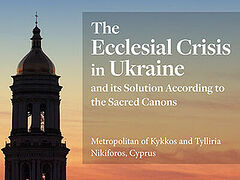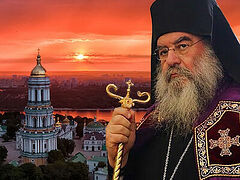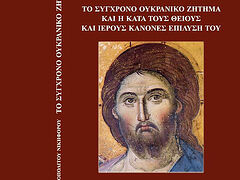His Eminence Metropolitan Isaiah of Tamassos and Orinis gave an interview to the Romfea Church news agency, which we have translated into English in three parts, frankly answering all the questions about his position regarding the actions of Constantinople, the West, and Moscow, and also commenting on the behavior of the Archbishop of Cyprus. In the end, Metropolitan Isaiah answered how, in his view, a resolution to the “Ukrainian question” could be reached.
 Metropolitan Isaiah of Tamassos
Metropolitan Isaiah of Tamassos
—Your Eminence, you are the sole Russian-speaking hierarch of the Church of the Cyprus who has studied theology and served in Russia for many years. Why did you study in Russia and not in Greece like all the other hierarchs of the Cypriot Church?
—I studied in Russia, but also in Greece and in the U.S. Indeed, since 1993, I have developed strong relations with Russia, thanks to my studies and missionary activity within the framework of my obedience to Metropolitan Nikiforos of Kykkos and Tillyria, who was then just the abbot of my monastery, and the ever-memorable Archbishop Chrysostomos I of Cyprus.
I was given so many tasks before leaving for Moscow that when they were described to me, to be honest, I was a little afraid of this huge responsibility I had to take upon myself.
My first goal was studying Russian to have the chance to get a theological education, and also a deep study of Russian Church history and the Russian culture and way of life; getting acquainted with higher and lower Russian clergy and cooperating with them; serving and strengthening our inter-Church relations; establishing contacts between Russian and Cypriot bishops through exchange visits; starting cooperation in ecclesiastical, cultural, and humanitarian spheres, and then developing and planning religious tourism between our countries.
Besides all of that, I had to introduce both Christian and non-Christian Russians to the natural, religious, and cultural values of Cyprus, to tell about their destruction in the occupied territories, and to generally inform the Russian public about Cyprus’ national problem.
Upon returning to Cyprus, with the blessing of my abbot, now Metropolitan Nikiforos of Kykkos and Tillyria, the Archbishop entrusted me with the care of the Russian-speaking Orthodox in Nicosia and asked me to help all the dioceses where some problems arose with the Russians.
For example, for a few years I was officially appointed the spiritual father and confessor of the Russian-speaking prisoners in the central prison, whose number was constantly growing.
I was involved in many types of activities, and have been successfully serving in many spheres for twenty-eight years now.
—How did your relations with the Russian Church and familiarity with Russian culture influence your position on the “Ukrainian question?” How do you explain your attitude towards the Ecumenical Patriarchate? Despite your disagreement with its actions, you often say that you respect and honor it.
—As for the question of the schismatic church of Ukraine, after studying the history and culture of our Churches for many years, I can confidently say that the emergence of the “OCU” occurred because of problems that have long existed in the relations between the Ecumenical and Moscow Patriarchates.
After the fall of the Byzantine Empire, the governing structures of the Ecumenical Patriarchate always thought, based on certain experience, that the Russian Empire (and later the Soviet Union and Russian Federation) sought to replace the primacy of the Ecumenical Patriarchate in Orthodoxy with the primacy of the Russian Orthodox Church.
All these vicissitudes and difficulties began after the so-called “Third Rome” theory1 arose in the fifteenth century, which manifested itself in various periods of Church history with different forces to a greater or lesser degree.
The realization of Moscow’s ambitions in practice would be a catastrophe for the Ecumenical Patriarchate, because then it would lose its historical privileges that brought it glory and honor, and also the international recognition and influence on the Orthodox Local Churches. Thus, it would become less useful for the West, and, consequently, it would be easier for the Turks to liquidate the Ecumenical Patriarchate in Istanbul, and the Ecumenical Patriarch would be forced to take refuge somewhere in the territory of the Greek diaspora.
This gradually created a common platform for negotiations between the Ecumenical Patriarchate and the Western governments, which had some common interests, but were driven by different motives.
This platform, thanks to the Greek diaspora, enjoys a great position and favor in America and Europe, where the largest (especially after the Asia Minor catastrophe) and most thriving flock is located. This is where the funding comes from for the Ecumenical Patriarchate, which has significant ties with this diaspora.
Naturally, such cooperation has always been encouraged by the U.S., especially at the time of the atheist regime of the Soviet Union, when the Ecumenical Patriarchate, having influence on all the Local Orthodox Churches, was considered by the United States and the rest of the Western world to be a kind of counterweight to the communist, political, and religious geostrategic expanse in which Orthodox Christians lived.
This fact automatically turned religious differences into a geostrategic conflict of a religious nature, inasmuch as the West has always perceived the Moscow Patriarchate as a serious tool of Russian diplomacy abroad.
Indeed, the Moscow Patriarchate, which had been taken hostage and persecuted by the Soviets, was easily used for foreign diplomacy by the Soviet authorities, even though the communists claimed that religion was the “opium” of the Soviet people and were eager to destroy it.
Although the situation changed dramatically with Perestroika, the often cautious and even hostile attitude of the West towards the Moscow Patriarchate has remained the same.
As some professors close to the Ecumenical Throne explained to me, in the minds and interests of the West, the Russian Federation is still a competitor because of the expansionist policy that the Russian Empire followed in its time, and then, because of communism in the USSR.
Today, the symbol of this competition is the current President of the Russian Federation, Vladimir Putin.
From this, it’s easy to conclude that for the West, everything that improves Mr. Putin’s image and makes him more attractive and therefore more competitive on the international stage should be demonized and devalued in the interests of his rivals.
And they are drawing us Orthodox into it too.
The Moscow Patriarchate is greatly subjected to persecution today because the West believes President Putin uses the ROC-MP to oppose the West in Orthodox countries. Thus, the position of the Church was and remains an important political issue for the implementation of the West’s key geostrategic goals in relation to its competitor—Russia.
You can agree or not with these facts, but this is the reality of the modern geopolitical chess game in which the Local Orthodox Churches are inevitably involved.
In this situation, which can be briefly described by the phrase, “Whoever is not with us is against us,” we, the Orthodox, are called to maintain a delicate balance between the people involved in it, to protect our Local Orthodox Churches as much as possible.
Interested people from various countries perceive and advance the Ecumenical Patriarch as the leader of all Orthodox primates, whom the Russians should also follow.
Regardless of how the Phanar handles this situation from an ecclesiastical point of view, the West, according to its recent statements, is heavily invested in strengthening and imposing the primacy of the Ecumenical Patriarch on all Local Churches.
Russia’s rivals, having good relations with the Phanar, seek to achieve their political goals on a global scale. To do this, they advance the Western concept of the existence of one spiritual leader for all Christians in the West, and, accordingly, one in the East.
To be fair, the Ecumenical Patriarchate has never publicly supported such things or hinted that it accepts them.
In its recent statements, the Ecumenical Patriarchate stated that although some forces agree with it on certain issues, including the Ukrainian problem, that doesn’t mean they have any influence over it.
Now, what do I, a bishop of the Cypriot Orthodox Church, think about all this?
I don’t object to both the West and the East supporting the Ecumenical Patriarchate so it can survive in Turkey.
Every Greek, and indeed every Orthodox should desire and strive for this. I’m not against the support of international institutions dealing with issues of religious freedom (of course, where it’s violated) or cooperation with the U.S., or with Europe and the East to protect the rights of the faithful.
I believe it’s necessary to cooperate both with the U.S. and the European Union, of which Greece is a member, not only in this sphere but in others as well—such as human rights, art, culture, and academia. Both the U.S. and Europe have something to share with other countries in these areas.
—In other words, you believe that the U.S. and Europe, in parallel with their interests, can offer something useful for the pastoral care of the faithful of our Church, including defending the rights of believers and defending human rights in general?
—Of course they can if they do it correctly, respecting our history, traditions, and theology.
Orthodox has constructively cooperated and still cooperates with the West in many fields, and there’s no reason this shouldn’t continue.
Here I must emphasize that my pastoral ministry has been greatly enriched thanks to my studies in four U.S. universities offered to the Kykkos Monastery by the U.S. Embassy in early 2000.
As part of the program for religious humanitarian organizations of the then-U.S. President George Bush, as the head of the humanitarian and missionary department of the Kykkos Monastery, I studied modern methods of social protection that could be used by religious organizations to preserve their culture and traditions. This knowledge has been useful to me in many situations.
Probably many remember my humanitarian work on five continents for more than fifteen years, when, as a representative not only of the holy Kykkos Monastery but of all of Cyprus, in at least three cases (Iraq, Sri Lanka [the tsunami], and Lebanon), I was involved in transferring humanitarian aid and worked on implementing a permanent support program in many countries in cooperation with the Doctors of the World organization, whose work in Cyprus was coordinated by Dr. Eleni Theocharous at that time.
Much of what I learned then I have successfully used in my diocese and today—of course, within the framework of Orthodox theology. An example is the creation and activity of the Tamassos Foundation for Social Services in the Field of Public Mutual Assistance, which professionally organized a network of social stores and other humanitarian and psychological support services in Cyprus on behalf of the Church.
Another area in which I use the knowledge I received abroad is cooperation with the KENTHEA center, which provides mental health services and the treatment of various addictions in Cyprus.
Part 2: When You Love Someone, You Tell Him the Truth
Part 3. “Both Russian and Greek Orthodox Christians Are Persecuted by the Godless of This World”




